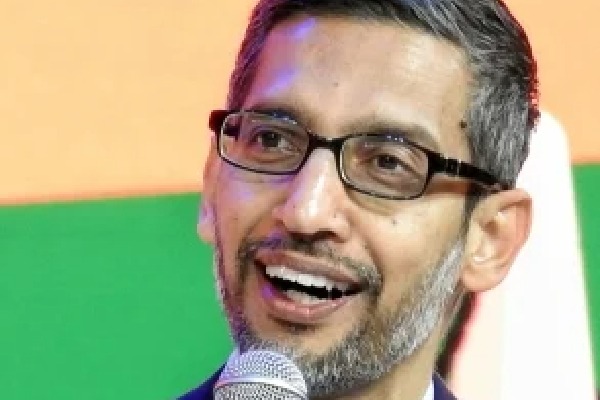Pichai's Prediction: AI to write Google's next 25 years, lift people's lives

For Alphabet and Google CEO Sundar Pichai, the next 25 years are crucial as with artificial intelligence (AI), the company has the opportunity to do things that matter on an even larger scale.
As Google looks ahead, the Indian-origin tech mogul has been reflecting on the commitment from the original founder’s letter in 2004: “to develop services that improve the lives of as many people as possible — to do things that matter.”
“We’re just beginning to see what the next wave of technology is capable of and how quickly it can improve,“ according to Pichai.
Today, one million people are using generative AI in the Google Workspace to write and create.
Flood forecasting now covers places where more than 460 million people live. A million researchers have used the AlphaFold database which covers 200 million predictions of protein structures, helping with advances to cut plastic pollution, tackle antibiotic resistance, fight malaria, and more.
“We’ve demonstrated how AI can help the airline industry to decrease contrails from planes, an important tool for fighting climate change,” he said in a detailed post on the “quarter century of change”.
Still, there is so much more ahead.
Over time, AI will be the biggest technological shift we see in our lifetimes. It’s bigger than the shift from desktop computing to mobile, and it may be bigger than the internet itself. It’s a fundamental rewiring of technology and an incredible accelerant of human ingenuity.
“Making AI more helpful for everyone, and deploying it responsibly, is the most important way we’ll deliver on our mission for the next 10 years and beyond,” Pichai noted.
“Our search for answers will drive extraordinary technology progress over the next 25 years. And in 2048, if, somewhere in the world, a teenager looks at all we’ve built with AI and shrugs, we’ll know we succeeded. And then we’ll get back to work,” he emphasised.
An essential truth of innovation is that the moment one pushes the boundary of a technology, it soon goes from extraordinary to ordinary.
“That’s why Google has never taken our success for granted,” according to Pichai.
Larry Page and Sergey Brin are the CEO and president of Google's parent company, Alphabet, respectively, first wrote down the mission 25 years ago -- to organise the world’s information and make it universally accessible and useful.
“They had an ambitious vision for a new kind of search engine to help people make sense of the waves of information moving online. The product they built, Google Search, went on to help billions of people around the world get answers to their questions,” said Pichai.
The questions Pichai asked Google have evolved over time: “How do you fix a dripping faucet?” “Fastest route to Stanford Hospital?” “Ways to calm a crying baby?” And right around spring of 2003, perhaps: “How to ace a Google interview?” And over time, Google got much better at answering them.
Search also laid the foundations for Google to make an economic impact beyond its own walls.
“Search is still at the core of our mission, and it’s still our biggest moonshot with so much more to do. Of course, Google today is more than a search box. We have 15 Google products that each serve more than half a billion people and businesses, and six that serve more than 2 billion users each,” Pichai noted.
Like most Google searches, all those products started with a question, too.
With Gmail, it was -- could we offer 1GB of storage to every person? In 2004, when Gmail launched, that volume of storage was over 100X what most other free webmail services were offering!
“Then a few years later, we saw an opportunity to dramatically improve web browsers — and in turn the web — for people everywhere. So with Chrome we asked: Could we build a browser that made the web better, with simplicity, speed, and security at its core? Right before launch, I had my own question: Will people use this?”
The questions have kept coming, and Google kept improving and expanding its products with new answers.
Designing products that help people at scale is both a privilege and a responsibility.
People have their own questions: Can we trust these new technologies?
“We think deeply about how to build responsible technology from the start, whether it’s making sure everyone’s information is protected and secure, or keeping people safe from bad actors online,” the Alphabet CEO said.